Jacke Wilson's Blog, page 46
December 31, 2016
History of Literature #74 – Great First Chapters (with Vu Tran)
[image error]
It’s a new year! A time for fresh beginnings! And on the History of Literature Podcast, it’s a time to celebrate beginnings. Vu Tran, author of the novel Dragonfish and a professor of creative writing at the University of Chicago, joins us to discuss ten great first chapters – how they work, how they affect the reader, and how they fulfill their author’s intentions.
Podcast: Play in new window | Download (Duration: 1:08:04 — 47.0MB) | Embed
Subscribe: iTunes | Android | RSS | More
Works Discussed:
The Great Gatsby, by F. Scott Fitzgerald
The Age of Innocence, by Edith Wharton
Invisible Man, by Ralph Ellison
The Secret History, by Donna Tartt
The Brief Wondrous Life of Oscar Wao, by Junot Diaz
One Hundred Years of Solitude, by Gabriel Garcia Marquez
The Virgin Suicides, by Jeffrey Eugenides
The Wind-Up Bird Chronicle, by Haruki Murakami
Beloved, by Toni Morrison
Disgrace, by J.M. Coetzee
Show Notes:
Contact the host at jackewilsonauthor@gmail.com or by leaving a voicemail at 1-361-4WILSON (1-361-494-5766).
You can find more literary discussion at jackewilson.com and more episodes of the series at historyofliterature.com.
Check out our Facebook page at facebook.com/historyofliterature.
On Twitter, you can follow Jacke Wilson at his handle @WriterJacke. You can also follow Mike and the Literature Supporters Club (and receive daily book recommendations) by looking for @literature SC.
Music Credits:
“Handel – Entrance to the Queen of Sheba” by Advent Chamber Orchestra (From the Free Music Archive / CC by SA).


December 26, 2016
History of Literature #73 – Javier Marias
[image error]
The Spanish novelist Javier Marías (b. 1951) has led a wild life, from his childhood as the son of a philosopher to his current role as the reigning sovereign of Redonda, a micronation located in the Pacific Ocean that has had a succession of writers as its king. Along the way, Marías has written and translated dozens of books, many of which have won some of Europe’s most esteemed prizes. His own philosophical novels have been translated into 42 languages – and yet, as the New York Times Book Review noted, he remains largely unknown in America. Why is that? And what are Americans missing? Host Jacke Wilson is joined by Mike Palindrome, the President of the Literature Supporters Club and an ardent devotee of Javier Marías, to discuss Marías and his novel A Heart So White.
Podcast: Play in new window | Download (Duration: 49:06 — 34.0MB) | Embed
Subscribe: iTunes | Android | RSS | More
Show Notes:
Contact the host at jackewilsonauthor@gmail.com or by leaving a voicemail at 1-361-4WILSON (1-361-494-5766).
You can find more literary discussion at jackewilson.com and more episodes of the series at historyofliterature.com.
Check out our Facebook page at facebook.com/historyofliterature.
On Twitter, you can follow Jacke Wilson at his handle @WriterJacke. You can also follow Mike and the Literature Supporters Club (and receive daily book recommendations) by looking for @literature SC.
Music Credits:
“Handel – Entrance to the Queen of Sheba” by Advent Chamber Orchestra (From the Free Music Archive / CC by SA).
“Sweeter Vermouth” by Kevin MacLeod (incompetech.com)
Licensed under Creative Commons: By Attribution 3.0.
December 18, 2016
History of Literature #72 Best Christmas Stories in Literature
[image error]
Sure, we all know the story of Frosty and Rudolph… but what about literary Christmas stories? How have great authors treated (or mistreated) this celebrated holiday? Mike Palindrome, President of the Literature Supporters Club, joins Jacke for a look at the ten best Christmas stories in literature. Authors discussed include Dostoevsky, Dickens, Willa Cather, Mark Twain, Ntozake Shange, Roderick Thorpe, Dr. Seuss, Thomas Mann, James Joyce, Hans Christian Andersen, Chekhov, O. Henry, and more. PLUS a special holiday tribute to Gar, the worst producer in the history of podcasting.
Podcast: Play in new window | Download (Duration: 1:18:14 — 54.0MB) | Embed
Subscribe: iTunes | Android | RSS | More
Show Notes:
Contact the host at jackewilsonauthor@gmail.com or by leaving a voicemail at 1-361-4WILSON (1-361-494-5766).
You can find more literary discussion at jackewilson.com and more episodes of the series at historyofliterature.com.
Check out our Facebook page at facebook.com/historyofliterature.
Follow Jacke and Mike on Twitter at @writerjacke (Jacke) and @literatureSC (Mike).
Music Credits:
“Handel – Entrance to the Queen of Sheba” by Advent Chamber Orchestra (From the Free Music Archive / CC by SA).
(Also featuring cameo appearances by Ella Fitzgerald, Louis Armstrong, Sir Paul McCartney, David Bowie, Bing Crosby, Mariah Carey, Sir Elton John, Jimmy Stewart, and Frank Sinatra.)


December 11, 2016
History of Literature #71 – Did Bob Dylan Deserve the Nobel Prize?
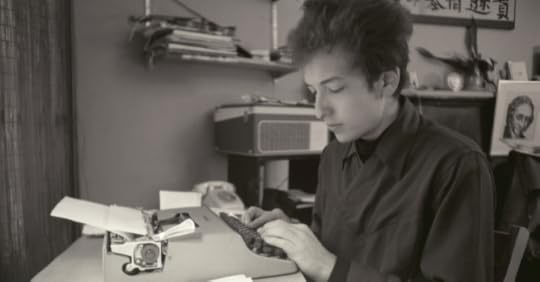
In 1959, a young singer-songwriter named Bob Zimmerman changed his name. As Bob Dylan, he then went on to change the world. After being lauded for more than 50 years for his songs and lyrics, this icon of the Sixties seemingly had achieved everything possible… and then the Nobel Committee awarded him the Nobel Prize for Literature. But does a writer of song lyrics deserve to be ranked among the world’s finest poets and novelists? Host Jacke Wilson is joined by Mike Palindrome, the President of the Literature Supporters Club, for a freewheelin’ conversation about the legendary Bob Dylan.
Bob Dylan Songs:
“Tangled Up in Blue” (performed by K.T. Tunstall); “Lay Lady Lay”; “My Back Pages” (performed by the Byrds); “Every Grain of Sand” (performed by Emmylou Harris)
Podcast: Play in new window | Download (Duration: 1:05:00 — 45.2MB) | Embed
Subscribe: iTunes | Android | RSS | More
Show Notes:
Contact the host at jackewilsonauthor@gmail.com or by leaving a voicemail at 1-361-4WILSON (1-361-494-5766).
You can find more literary discussion at jackewilson.com and more episodes of the series at historyofliterature.com.
Check out our Facebook page at facebook.com/historyofliterature.
Music Credits:
“Handel – Entrance to the Queen of Sheba” by Advent Chamber Orchestra (From the Free Music Archive / CC by SA).
December 4, 2016
History of Literature #70 – Shakespeare’s Julius Caesar
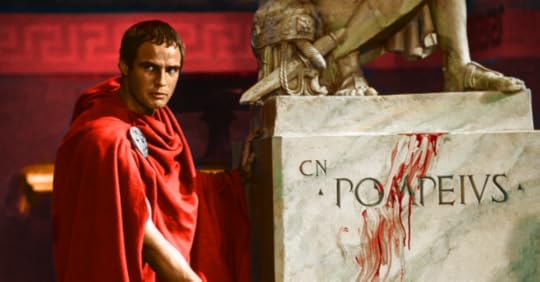
Just after World War II, the poet and critic W.H. Auden said that Shakespeare’s Julius Caesar (ca. 1959) is “of great relevance to our time, though it is gloomier, because it is about a society that is doomed. We are not doomed, but in such immense danger that the relevance is great. [Rome] was a society not doomed by the evil passions of selfish individuals…but by an intellectual and spiritual failure of nerve that made the society incapable of coping with its situation.” Why is Julius Caesar so continually important to those living in a liberal democracy? What does it tell us about the relationship of an individual to society and the state? And as the citizens of a republic lose their faith in institutions, how do we reconcile the noble ambition of a Caesar with the high-minded (but bloody) principles of the assassin Brutus?
In this episode, host Jacke Wilson takes a look at Shakespeare’s play, the portrayals of Brutus (James Mason) and Mark Antony (Marlon Brando) in the 1953 film, the fraught morality of assassination, the surprising links between John Wilkes Booth and the play, and an essay from The Journal of Democracy describing the declining faith in liberal democracies in 2016.
Podcast: Play in new window | Download (Duration: 1:07:24 — 46.6MB) | Embed
Subscribe: iTunes | Android | RSS | More
Show Notes:
Contact the host at jackewilsonauthor@gmail.com or by leaving a voicemail at 1-361-4WILSON (1-361-494-5766).
You can find more literary discussion at jackewilson.com and more episodes of the series at historyofliterature.com.
Check out our Facebook page at facebook.com/historyofliterature.
Music Credits:
“Handel – Entrance to the Queen of Sheba” by Advent Chamber Orchestra (From the Free Music Archive / CC by SA).
November 27, 2016
History of Literature #69 – Virginia Woolf and Her Enemies (with Professor Andrea Zemgulys) / Children’s Books
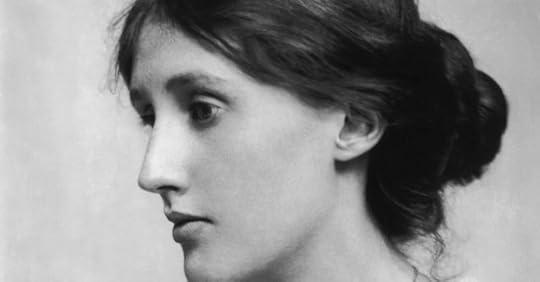
Early in her career, novelist Virginia Woolf (1882-1941) wrote a critical essay in which she set forth her views of what fiction can and should do. The essay was called “Modern Fiction” (1919), and it has served critics and readers as a guide to Modernism (and Woolf) ever since. But while it’s easy to follow her arguments about the authors who became giants in the world of literature such as Joyce and Chekhov, it’s less easy to understand her statements about the authors she criticized, contemporary best sellers H.G. Wells, Arnold Bennett, and John Galsworthy. What was behind her savage criticism of these three? What does her animosity tell us about Woolf’s views of fiction? Professor Andrea Zemgulys of the University of Michigan joins Jacke to help him figure this out. Then a pair of children’s book experts (Jacke Wilson Jr. and Jacke Wilson Jr. Jr.) join Jacke in the studio to discuss buying holiday books for children.
Podcast: Play in new window | Download (Duration: 54:01 — 37.4MB) | Embed
Subscribe: iTunes | Android | RSS | More
Show Notes:
Contact the host at jackewilsonauthor@gmail.com or by leaving a voicemail at 1-361-4WILSON (1-361-494-5766).
You can find more literary discussion at jackewilson.com and more episodes of the series at historyofliterature.com.
Check out our Facebook page at facebook.com/historyofliterature.
Music Credits:
“Handel – Entrance to the Queen of Sheba” by Advent Chamber Orchestra (From the Free Music Archive / CC by SA).
“Quirky Dog,” “Sweeter Vermouth, and “Monkeys Spinning Monkeys” by Kevin MacLeod (incompetech.com)
Licensed under Creative Commons: By Attribution 3.0


November 23, 2016
History of Literature #68 – Listener Feedback and Thanksgiving Thoughts
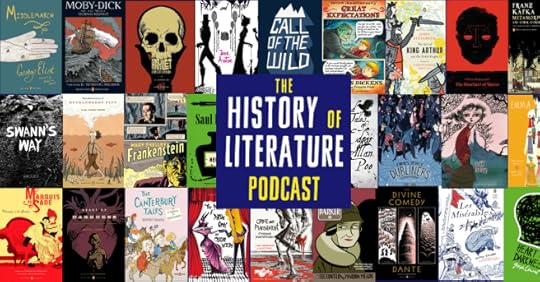
It’s the Thanksgiving episode! Jacke and Mike respond to listener feedback and discuss some literary things to thankful for. Authors discussed include Edith Wharton, John Fowles, Ernest Hemingway, Vu Tran, Lydia Davis, Gary Snyder, Walt Whitman, Elena Ferrante, Walker Percy, Madeleine Thien, James Wood, Harold Bloom, and more!
Podcast: Play in new window | Download (Duration: 42:28 — 29.4MB) | Embed
Subscribe: iTunes | Android | RSS | More
Show Notes:
Contact the host at jackewilsonauthor@gmail.com or by leaving a voicemail at 1-361-4WILSON (1-361-494-5766).
You can find more literary discussion at jackewilson.com and more episodes of the series at historyofliterature.com.
Check out our Facebook page at facebook.com/historyofliterature.
Music Credits:
“Handel – Entrance to the Queen of Sheba” by Advent Chamber Orchestra (From the Free Music Archive / CC by SA).
“Darxieland” by Kevin MacLeod (incompetech.com)
Licensed under Creative Commons: By Attribution 3.0


November 17, 2016
History of Literature #67 – Pascal’s Wager and an American Election
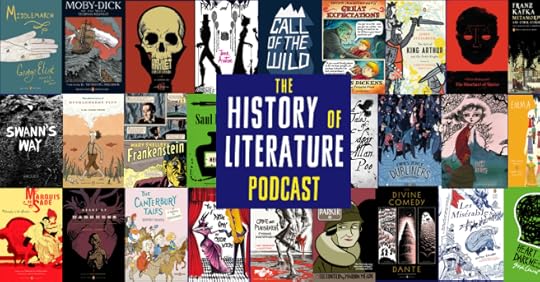
Jacke digs into his origins in rural Wisconsin and offers some thoughts on race, literature, and the recent election. Also featured: René Descartes, Blaise Pascal, Friedrich Nietzsche, Ayn Rand, and Simone de Beauvoir.
Podcast: Play in new window | Download (Duration: 1:23:39 — 57.7MB) | Embed
Subscribe: iTunes | Android | RSS | More
Show Notes:
We have a special episode coming up – listener feedback! Contact the host at jackewilsonauthor@gmail.com or by leaving a voicemail at 1-361-4WILSON (1-361-494-5766).
You can find more literary discussion at jackewilson.com and more episodes of the series at historyofliterature.com.
Check out our Facebook page at facebook.com/historyofliterature.
Music Credits:
“Handel – Entrance to the Queen of Sheba” by Advent Chamber Orchestra (From the Free Music Archive / CC by SA).
“Piano Between” by Kevin MacLeod (incompetech.com)
Licensed under Creative Commons: By Attribution 3.0


November 3, 2016
History of Literature #66: James Baldwin, Wallace Stegner, GB Tran, Lois Duncan (with author Shawna Yang Ryan
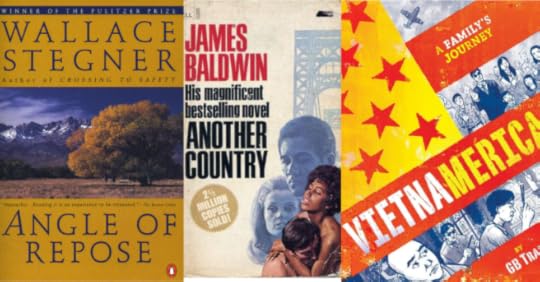
What can we do to unlock the past? How do family secrets affect us? Author Shawna Yang Ryan has spent a lot of time thinking about these issues – and in this episode, she joins Jacke for a discussion of some of her favorite books, including the novel that led her to rethink her understanding of the American West and the graphic novel about a family’s journey that can bring her to tears.
SHAWNA YANG RYAN is a former Fulbright scholar and the author of Water Ghosts (Penguin Press 2009) and Green Island (Knopf 2016). She teaches in the Creative Writing Program at the University of Hawai’i at Manoa. Her short fiction has appeared inZYZZYVA, The Asian American Literary Review, Kartika Review, andThe Berkeley Fiction Review. She is the 2015 recipient of the Elliot Cades Emerging Writer award. Originally from California, she now lives in Honolulu.
Podcast: Play in new window | Download (Duration: 58:44 — 40.6MB) | Embed
Subscribe: iTunes | Android | RSS | More
Works Discussed:
Green Island and Water Ghosts by Shawna Yang Ryan
Another Country by James Baldwin
Angle of Repose by Wallace Stegner
Vietnamerica: A Family’s Journey by GB Tran
Locked in Time by Lois Duncan
Tuck Everlasting by Natalie Babbitt
Yi Yi [A One and a Two…] directed by Edward Yang
Show Notes:
We have a special episode coming up – listener feedback! Contact the host at jackewilsonauthor@gmail.com or by leaving a voicemail at 1-361-4WILSON (1-361-494-5766).
You can find more literary discussion at jackewilson.com and more episodes of the series at historyofliterature.com.
Check out our Facebook page at facebook.com/historyofliterature.
Music Credits:
“Handel – Entrance to the Queen of Sheba” by Advent Chamber Orchestra (From the Free Music Archive / CC by SA).
“Monkeys Spinning Monkeys” and “Greta Sting” by Kevin MacLeod (incompetech.com)
Licensed under Creative Commons: By Attribution 3.0


October 27, 2016
The History of Literature #65 – Mary Shelley’s Frankenstein (with Professor James Chandler)
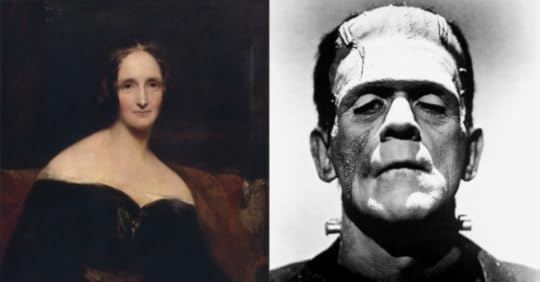
By any measure, Mary Shelley (1797-1851) lived a radical life. As the daughter of William Godwin and Mary Wollstonecraft, two philosophers devoted to principles of freedom and equality, she grew up in a tumultuous world of exciting new ideas and strong advocacy for social change. After she and the Romantic poet Percy Bysshe Shelley eloped at a young age, they spent a rainy summer with Lord Byron and two other friends in a cottage in Geneva, Switzerland, where they passed the time by inventing ghost stories. And it was in that cottage that what is probably the most famous Halloween story of all time, Mary Shelley’s novelFrankenstein: or, The Modern Prometheus (1818), was brought to life.
What ideas shaped this famous story of a scientist who successfully animates a corpse before ruing the consequences? What does the novel have to say about the importance of human relationships in our society? And how does the novel connect to Frank Capra’s Christmas film, It’s a Wonderful Life? In this special Halloween episode, we’ll talk to Professor James Chandler of the University of Chicago, author of An Archaeology of Sympathy: The Sentimental Mode in Literature and Cinema, about the fascinating world of Mary Shelley, her novel Frankenstein, and the films they inspired.
Podcast: Play in new window | Download (Duration: 1:09:31 — 48.0MB) | Embed
Subscribe: iTunes | Android | RSS | More
Works Discussed:
An Archaeology of Sympathy: The Sentimental Mode in Literature and Cinema, by James Chandler
Great Expectations, by Charles Dickens
Frankenstein, or, The Modern Prometheus, by Mary Shelley
Show Notes:
We have a special episode coming up – listener feedback! Contact the host at jackewilsonauthor@gmail.com or by leaving a voicemail at 1-361-4WILSON (1-361-494-5766).
You can find more literary discussion at jackewilson.com and more episodes of the series at historyofliterature.com.
Check out our Facebook page at facebook.com/historyofliterature.
Music Credits:
“Handel – Entrance to the Queen of Sheba” by Advent Chamber Orchestra (From the Free Music Archive / CC by SA).
“Supernatural Radio A” and “Greta Sting” by Kevin MacLeod (incompetech.com)
Licensed under Creative Commons: By Attribution 3.0












